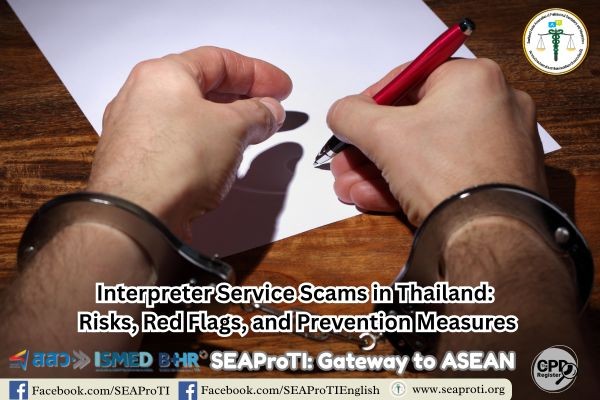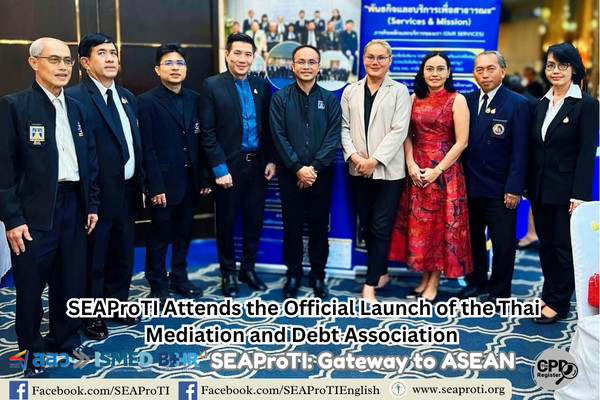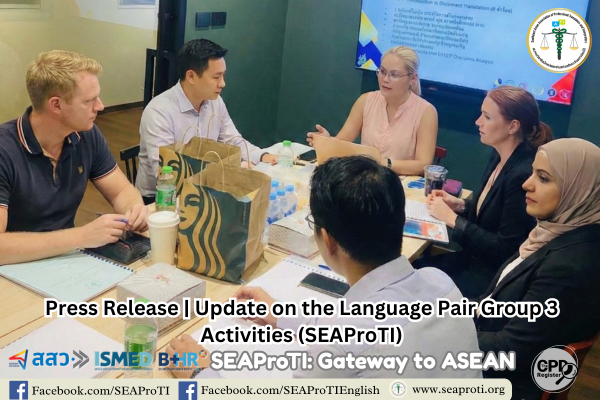Interpreter Service Scams in Thailand: Risks, Red Flags, and Prevention Measures
17 November 2025, Bangkok — In recent years, Thailand has seen a significant rise in interpreter service scams, which have caused serious harm to both clients and professional interpreters. These scams carry legal, financial, and ethical implications and often involve various deceptive tactics—ranging from impersonating certified interpreters, stealing personal data of real professionals, and creating fake websites to posting fraudulent “interpreter job offers,” particularly in Thai–Chinese language pairs. Some of these schemes are linked to human trafficking networks and exploitative labor practices.
This article outlines the main types of scams, key warning signs, and preventative measures for both clients and practitioners in Thailand’s interpreting industry.
1. Common Types of Interpreter Scams
1.1 Identity Theft of Real Interpreters
Scammers often steal the names, photos, certificates, and professional profiles of legitimate interpreters to deceive clients. This leads to:
- Clients losing money to fraudulent service providers
- Reputational damage to the real interpreters
- Misuse of confidential documents and sensitive information
1.2 Fake Websites and Counterfeit Certificates
Many cases involve fabricated websites, imitation government seals, or forged “certifications” designed to appear credible. In reality, these entities:
- Are not registered
- Have no physical office
- Possess no professional qualifications
1.3 Unqualified Individuals Claiming to Be “Certified Interpreters”
Legal, police, and medical environments require certified or officially recognized interpreters. However, many unqualified individuals infiltrate these settings, causing:
- Misinterpretations that distort justice
- Incorrect information provided to patients
- Inaccurate or invalid translation of testimony and documents
1.4 Fake Interpreter Job Advertisements (Especially Thai–Chinese)
Scammers frequently post interpreter jobs promising unusually high pay and requiring travel to border areas or neighboring countries. Some cases are linked to:
- Human trafficking
- Forced labor
- Exploitative working conditions
- This type of scam is particularly dangerous for new interpreters who lack experience in assessing job legitimacy.
2. Impact on Clients and on Legal–Medical Systems
Interpreter scams can cause severe consequences, including:
- Financial losses from fraudulent assignments
- Legal risks when inaccurate translations or interpretations are used
- Failures in judicial processes due to unqualified interpreters
- Data breaches when clients send documents to impostors
- Damage to professional reputations of interpreters whose identities are stolen
3. Prevention Measures for Clients
✔ 3.1 Verify Credentials with Recognized Institutions, such as, SEAProTI, accredited professional associations, and official rosters of court or hospital interpreters.
✔ 3.2 Verify Company Registration through the Department of Business Development (DBD), the Ministry of Labour, and relevant government databases.
✔ 3.3 Require a Written Contract, including, scope of work, fees, cancellation terms, and clear contact information.
✔ 3.4 Avoid Off-Platform Payments, such as, transfers to personal accounts, non-official communication channels, and requests for immediate payment
✔ 3.5 Be Cautious of Offers That Are Too Good to Be True, for example, “guaranteed court or visa results”, suspiciously low or excessively high fees, and pressure to decide quickly
4. Policy Recommendations
To address the issue at a systemic level, the following measures are recommended:
- Establishing a centralized database of certified interpreters
- Regulating the use of government logos and seals
- Strengthening enforcement against online impersonation
- Raising public and private-sector awareness of professional standards
Conclusion
Interpreter service scams in Thailand are complex and diverse, posing risks to clients, professionals, and the justice system as a whole. Verifying information, using services from reputable professional organizations, and insisting on transparent agreements are crucial steps in preventing harm. Clients must recognize that interpreting is a high-responsibility profession requiring certified expertise—not a service to be chosen based on price alone.
References
- SEAProTI. (2024). Guidelines for certified translators and interpreters in Thailand. Southeast Asian Association of Professional Translators and Interpreters.
- Thai Ministry of Justice. (2023). Standards for court interpretation and translation in judicial proceedings.
- United Nations Office on Drugs and Crime. (2022). Human trafficking and migrant smuggling in Southeast Asia: Trends and risks.
- Wang, Y., & Chen, L. (2021). Interpreter identity fraud and cross-border recruitment scams in Southeast Asia. Journal of Language and Security, 14(2), 55–72.
- World Health Organization. (2020). Standards for medical interpretation in healthcare settings.
About Certified Translators, Translation Certifiers, and Certified Interpreters of SEAProTI
The Southeast Asian Association of Professional Translators and Interpreters (SEAProTI) has formally announced the qualifications and requirements for registration of Certified Translators, Translation Certification Providers, and Certified Interpreters in Sections 9 and 10 of the Royal Gazette, published by the Secretariat of the Cabinet, Office of the Prime Minister of Thailand, on 25 July 2024 (Vol. 141, Part 66 Ng, p. 100). Certified Translators, Translation Certification Providers, and Certified Interpreters
The Council of State has proposed the enactment of a Royal Decree, granting registered translators and recognized translation certifiers from professional associations or accredited language institutions the authority to provide legally valid translation certification (Letter to SEAProTI dated April 28, 2025)
SEAProTI is the first professional association in Thailand and Southeast Asia to implement a comprehensive certification system for translators, certifiers, and interpreters.
Head Office: Baan Ratchakru Building, No. 33, Room 402, Soi Phahonyothin 5, Phahonyothin Road, Phaya Thai District, Bangkok 10400, Thailand
Email: hello@seaproti.com | Tel.: (+66) 2-114-3128 (Office hours: Mon–Fri, 09:00–17:00)
ภัยหลอกลวงด้านบริการล่ามในประเทศไทย: ความเสี่ยง ข้อสังเกต และแนวทางป้องกัน
17 พฤศจิกายน 2568, กรุงเทพมหานคร – ในช่วงไม่กี่ปีที่ผ่านมา ประเทศไทยพบการเพิ่มขึ้นของ กลโกงด้านบริการล่าม (interpreter service scams) ซึ่งส่งผลกระทบทั้งต่อผู้ว่าจ้างและต่อผู้ประกอบวิชาชีพล่ามอย่างร้ายแรง ทั้งในด้านกฎหมาย การเงิน และจริยธรรมทางวิชาชีพ นักต้มตุ๋นมักใช้วิธีหลากหลายรูปแบบ ไม่ว่าจะเป็นการแอบอ้างตนเป็นล่ามรับรอง การขโมยข้อมูลส่วนบุคคลของล่ามจริง การทำเว็บไซต์ปลอม ไปจนถึงการเสนอ “งานล่ามปลอม” โดยเฉพาะในคู่ภาษาไทย–จีน ซึ่งอาจเกี่ยวข้องกับการค้ามนุษย์และการแสวงหาประโยชน์ด้านแรงงานอย่างผิดกฎหมาย
บทความนี้สรุปลักษณะของภัยหลอกลวง วิธีสังเกต และแนวทางการป้องกันสำหรับผู้ใช้บริการและผู้ปฏิบัติงานด้านล่ามในประเทศไทย
1. รูปแบบกลโกงที่พบบ่อย
1.1 การขโมยตัวตนของล่ามจริง (“การขโมยตัวตนของนักแปลจริง”)
ผู้ไม่หวังดีมักขโมยชื่อ รูปภาพ ใบประกาศ และประวัติของล่ามมืออาชีพมาใช้แอบอ้างเพื่อหลอกลวงลูกค้า ทำให้เกิดปัญหา เช่น ลูกค้าสูญเสียเงินจากการจ้างงานปลอม ล่ามจริงถูกทำลายชื่อเสียงโดยไม่รู้ตัว เอกสารหรือข้อมูลสำคัญถูกใช้ผิดวัตถุประสงค์
1.2 เว็บไซต์และใบรับรองปลอม
หลายกรณีพบว่า มีการสร้างเว็บไซต์ปลอม ใช้โลโก้ราชการปลอม หรือออก “ใบรับรองปลอม” เพื่อสร้างความน่าเชื่อถือ แต่แท้จริงแล้วไม่มีการจดทะเบียน ไม่มีสำนักงานจริง และไม่มีคุณสมบัติวิชาชีพใด ๆ
1.3 ผู้ไม่มีคุณสมบัติอ้างว่าเป็น “ล่ามรับรอง”
ในงานด้านศาล ตำรวจ และการแพทย์ จำเป็นต้องใช้ ล่ามที่มีการรับรองตามกฎหมายหรือได้รับการรับรองจากหน่วยงานทางวิชาชีพ แต่ผู้แอบอ้างจำนวนมากเข้ามาให้บริการโดยไม่มีคุณสมบัติ ส่งผลให้ เกิดความผิดพลาดในกระบวนการยุติธรรม ผู้ป่วยได้รับข้อมูลผิดพลาด เอกสารหรือคำเบิกความถูกตีความผิด
1.4 โฆษณางานล่ามปลอม โดยเฉพาะคู่ภาษาไทย–จีน
มิจฉาชีพมักโพสต์งานล่ามที่เสนอตอบแทนสูงผิดปกติ ให้เดินทางไปชายแดนหรือประเทศเพื่อนบ้าน ซึ่งบางครั้งเชื่อมโยงกับ การค้ามนุษย์ การกักขังบังคับทำงาน การแสวงหาผลประโยชน์ด้านแรงงาน
2. ผลกระทบต่อผู้ใช้บริการและต่อระบบกฎหมาย–การแพทย์
กลโกงของล่ามส่งผลร้ายแรงต่อหลายด้าน เช่น ความเสียหายทางการเงิน จากงานปลอม ความเสี่ยงทางกฎหมาย หากเอกสารหรือคำแปลผิดพลาด การล้มเหลวของกระบวนการยุติธรรม เมื่อล่ามไม่ผ่านมาตรฐาน ข้อมูลส่วนบุคคลรั่วไหล จากการส่งเอกสารให้ผู้แอบอ้าง ความเสียหายต่อชื่อเสียงวิชาชีพ ของล่ามผู้ถูกขโมยตัวตน
3. แนวทางป้องกันสำหรับผู้ใช้บริการ
✔ 3.1 ตรวจสอบคุณสมบัติกับหน่วยงานที่เชื่อถือได้ เช่น SEAProTI สมาคมวิชาชีพที่ได้รับการรับรอง รายชื่อผู้ปฏิบัติงานล่ามในศาลหรือโรงพยาบาล
✔ 3.2 ตรวจสอบการจดทะเบียนบริษัท ผ่าน กรมพัฒนาธุรกิจการค้า (DBD) กระทรวงแรงงาน ฐานข้อมูลหน่วยงานราชการที่เกี่ยวข้อง
✔ 3.3 ต้องมีสัญญาเป็นลายลักษณ์อักษร ระบุขอบเขตงาน ค่าบริการ เงื่อนไขการยกเลิก และข้อมูลติดต่อชัดเจน
✔ 3.4 หลีกเลี่ยงการโอนเงินนอกแพลตฟอร์ม เช่น บัญชีบุคคล ช่องทางสื่อสารที่ไม่เป็นทางการ การเร่งรัดให้จ่ายเงินทันที
✔ 3.5 ระวังข้อเสนอที่ดีเกินจริง เช่น สัญญาว่า “การันตีผลทางศาลหรือทางวีซ่า” ค่าบริการต่ำผิดปกติหรือสูงผิดปกติ กดดันให้รีบตัดสินใจ
4. ข้อเสนอเชิงนโยบาย
เพื่อป้องกันปัญหาในระดับโครงสร้าง ควรมีมาตรการ เช่น การสร้างฐานข้อมูลกลางของล่ามรับรอง การกำกับดูแลการใช้โลโก้และตราราชการ การปราบปรามการแอบอ้างในโลกออนไลน์ การให้ความรู้แก่ประชาชนและหน่วยงานเอกชนเกี่ยวกับมาตรฐานวิชาชีพ
บทสรุป
กลโกงด้านบริการล่ามในประเทศไทยเป็นภัยที่ซับซ้อนและหลากหลายรูปแบบ ส่งผลทั้งต่อผู้ใช้บริการ ล่ามที่ถูกแอบอ้าง และกระบวนการยุติธรรมโดยรวม การตรวจสอบข้อมูล การใช้บริการจากองค์กรวิชาชีพที่เชื่อถือได้ และการทำสัญญาที่โปร่งใสคือเครื่องมือสำคัญในการป้องกันความเสียหาย ผู้ว่าจ้างควรตระหนักว่า “บริการล่าม” เป็นงานที่มีความสำคัญสูงและต้องอาศัยผู้เชี่ยวชาญที่ได้รับการรับรอง ไม่ใช่งานที่สามารถตัดสินใจจากราคาเพียงอย่างเดียว
เอกสารอ้างอิง
- SEAProTI. (2024). Guidelines for certified translators and interpreters in Thailand. Southeast Asian Association of Professional Translators and Interpreters.
- Thai Ministry of Justice. (2023). Standards for court interpretation and translation in judicial proceedings.
- United Nations Office on Drugs and Crime. (2022). Human trafficking and migrant smuggling in Southeast Asia: Trends and risks.
- Wang, Y., & Chen, L. (2021). Interpreter identity fraud and cross-border recruitment scams in Southeast Asia. Journal of Language and Security, 14(2), 55–72.
- World Health Organization. (2020). Standards for medical interpretation in healthcare settings.
สมาคมวิชาชีพนักแปลและล่ามแห่งเอเชียตะวันออกเฉียงใต้ (SEAProTI) ได้ประกาศหลักเกณฑ์และคุณสมบัติผู้ที่ขึ้นทะเบียนเป็น “นักแปลรับรอง (Certified Translators) และผู้รับรองการแปล (Translation Certification Providers) และล่ามรับรอง (Certified Interpreters)” ของสมาคม หมวดที่ 9 และหมวดที่ 10 ในราชกิจจานุเบกษา ของสำนักเลขาธิการคณะรัฐมนตรี ในสำนักนายกรัฐมนตรี แห่งราชอาณาจักรไทย ลงวันที่ 25 ก.ค. 2567 เล่มที่ 141 ตอนที่ 66 ง หน้า 100 อ่านฉบับเต็มได้ที่: นักแปลรับรอง ผู้รับรองการแปล และล่ามรับรอง
สำนักคณะกรรมการกฤษฎีกาเสนอให้ตราเป็นพระราชกฤษฎีกา โดยกำหนดให้นักแปลที่ขึ้นทะเบียน รวมถึงผู้รับรองการแปลจากสมาคมวิชาชีพหรือสถาบันสอนภาษาที่มีการอบรมและขึ้นทะเบียน สามารถรับรองคำแปหฟลได้ (จดหมายถึงสมาคม SEAProTI ลงวันที่ 28 เม.ย. 2568)
สมาคมวิชาชีพนักแปลและล่ามแห่งเอเชียตะวันออกเฉียงใต้ เป็นสมาคมวิชาชีพแห่งแรกในประเทศไทยและภูมิภาคเอเชียตะวันออกเฉียงใต้ที่มีระบบรับรองนักแปลรับรอง ผู้รับรองการแปล และล่ามรับรอง
สำนักงานใหญ่: อาคารบ้านราชครู เลขที่ 33 ห้อง 402 ซอยพหลโยธิน 5 ถนนพหลโยธิน แขวงพญาไท เขตพญาไท กรุงเทพมหานคร 10400 ประเทศไทย
อีเมล: hello@seaproti.com โทรศัพท์: (+66) 2-114-3128 (เวลาทำการ: วันจันทร์–วันศุกร์ เวลา 09.00–17.00 น.

























